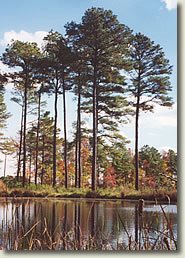
As a follow-up on the blog about Carbon Dioxide being classified by New Jersey officials as a “contaminant,” I have just read an article in the Washington Post about a research project being done at Duke University. They have erected 100-foot towers in a grove of loblolly pines. The towers spew out CO2 and literally bathe the pine trees in the stuff. The researchers then collect data on growth rates and numbers of needles, cones and seeds the trees produce, compared to trees not treated with increased concentrations of CO2.
The results have been somewhat predictable (in fact, pumping CO2 into commercial greenhouses to increase growth is a common practice.) Since CO2 is the limiting factor in photosynthesis—that is, the factor that there is the least of (compared with light and water)—it would be predicted that adding more would allow more photosynthesis—and hence growth—to occur. And it logically follows that the more growth, the more reproduction, from seeds produced in cones.
All this sounds good for the loblollies. But, of course, that’s not the whole story. Ecology is never as simple as the observation of one event or one species. When we talk about the complexity of life, we are not just dealing with individual cells, organisms or species. Ecology deals with the interactions of organisms with each other and with their environment—the most complex and intricate system of interactions in the living—or non-living—universe. The biosphere of Planet Earth is so complex and varied that science has but begun to understand it at the most basic level. Ecology is in its infancy as a field of biology; that is what makes it so exciting.
That brings us back to the Duke researchers and their predictions about the ultimate results of increased atmospheric CO2. What will faster growing, faster reproducing pines mean for the ecosystem as a whole? Here is where it gets tricky. Loblollies are mixed in with slower-growing hardwoods, such as oaks and hickories, which will not likely benefit from increased CO2 as much as the naturally faster growing pines. That means that the pines could in time crowd out the hardwoods. So What? The problem is that other species—birds and mammals—depend on acorns and hickory nuts for food. So you see that altering one aspect of an ecosystem affects all others, in ways that may or may not be predictable.
That’s enough bio-talk for now—more to follow. But what is the moral of this story? The world would say, “It’s not nice to fool with Mother Nature.” As believers in God as the creator of all things, including the biosphere and all creatures therein, we have a much different perspective: God made it very good; man messed it up with sin; God cursed the ground—yet sustains even His cursed creation, causing organisms to adapt to the fallen environment; we, by our actions, tend to mess things up even further, yet strive to obey God’s command to be good stewards—and that is another reason why my motto stands: “If you don’t understand Genesis 3, you don’t really understand anything!”


No comments:
Post a Comment